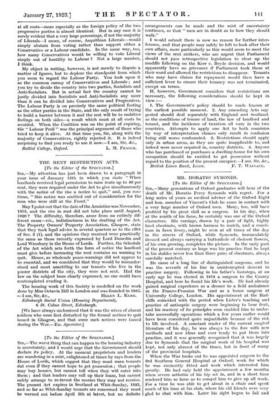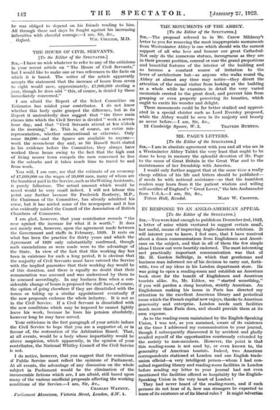MR. HORATIO SYMONDS.
[To the Editor of the SPECTATOR.] Sxn,—Many generations of Oxford graduates will hear of the death of Mr. Horatio Percy Symonds with regret. For a long series of years as medical adviser of the Oxford Eight and hon. member of Vincent's Club he came in contact with a very large number of Oxford men. Many, too, will have profited by his great skill as a surgeon. In his day, when at the zenith of his fame, he certainly was one of the Oxford characters. His carriage, drawn by a pair of light, highly bred chestnuts, with brown harness to match, and a coach- man in fawn livery, might be seen at all times of the day in the streets of Oxford, while Symonds, immaculately dressed and always carrying a buttonhole of choicest flowers, of his own growing, completes the picture. In the early part of the present century so large was his practice that he kept in his stables never less than three pairs of chestnuts, always carefully matched.
He came of a long line of distinguished surgeons, and he was the seventh of his line in uninterrupted descent to practice surgery. Following in his father's footsteps, at an early age he was elected in 1878 a surgeon to the County Hospital, and here he found his life's work. He had already gained surgical experience as a dresser to a field ambulance in the Franco-Prussian War and as a house surgeon at University College, London. His appointment at the Rad- cliffe coincided with the period when Lister's teaching and practice of antiseptic surgery were beginning to bear fruit, and his mastery of its principles soon enabled him to under- take successfully operations which a few years earlier would have been considered quite unjustifiable because of the risk to life involved. A constant reader of the current surgical literature of his day, lie was always to the fort with new methods and new ideas and ever ready to put them into practice, and it was generally recognized that it was largely due to Symonds that the surgical work of his hospital was kept, not only abreast of the times, but in front of many of the provincial hospitals.
When the War broke out he was appointed surgeon to the 8rd Southern General Hospital at Oxford, work for which he was eminently fitted and work which interested him greatly. He had only held the appointment a few months when severe arthritis of his hip set in, and in a short time rendered him so lame as to compel him to give up all work. For a time he was able to get about in a chair and spent much of his time at his club, where his old friends were very glad -to chat with him. Later his sight began to fail and he was obliged to depend on his friends reading to him. All through these sad days he fought against his increasing infirmities with cheerful courage.—I am, Sir, &c.,











































 Previous page
Previous page